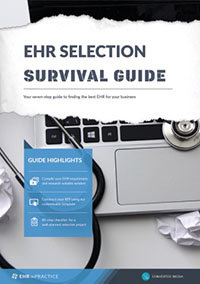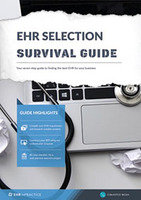The Ultimate EHR Selection Checklist
Selecting an EHR system, can be high stakes, particularly when considering the costs associated with not selecting the right system. Breaking it off with an EHR vendor carries with it both software and hardware related costs and staff time spent migrating over to a new system, coupled with all costs related to lost productivity in the switch.
In a highly segmented EHR market, many consumers, not just the hard to please or impulsive ones, often find themselves seeking out greener EHR system pastures (to the tune of a 30% churn rate) after they realize they have selected the wrong system. When starting the acquisition process, using a checklist which can serve as a framework for decision making serves as a useful tool, not only for making the acquisition process more methodical, but also for engaging stakeholders within your organization during the acquisition process.
To get started toward a successful acquisition, you first must understand what your requirements are for an EHR, HRSA provides a useful resource to guide consumers through the selection process. The resource provided by HRSA can be a bit heavy due to the fact it attempts to be an all-encompassing resource for all consumers. However, using HRSA and other resources the selection process can be distilled down to a more manageable list of crucial points. Here is our EHR selection checklist:
Startup cost, operating costs and ROI - Do the startup and operating costs satisfy our desired ROI?
- What is our organization’s desired ROI from an EHR system and how long will it take to meet this this ROI goal?
- Can our EHR needs be met by a free open source system or does it require off the shelf software?
- How much training is needed to implement the software?
- Does the vendor offer training and ongoing support?
- What are the out of the box and ongoing costs for the software?
Recommended Reading: EHR Selection survival Guide - Partner your EHR selection checklist with our survival guide
Implementation - How long and what resources will be needed to roll out the EHR system?
- How long will the system take to get up and running?
- How much disruption will the roll out cause?
- Does the vendor offer technical support in designing the implementation process?
- What have other clinicians and staff currently using EHR system experienced during the implementation process?
Functionality - What does it do and does it meet present and future needs?
- Does the EHR offer patient demographic and care management data?
- Does the EHR offer clinical decision support and reports
- Is the EHR data interoperable with other providers, laboratories, pharmacies, patients and government disease registries?
- Does the EHR ‘s functionality fit into Meaningful Use goals.
The EHR selection checklist presented above streamlines the selection process, however it is important to note that the lists under the three main themes can be expanded to fit specific needs. Overall when considering the selection process the decision making process is best understood as being a function of cost, ease of implementation and functionality. If an EHR shows potential issues in any of these areas it may be an indication that it is not a good fit for your organization.
Free white paper

EHR Selection Survival Guide
The comprehensive guide to selecting the best EHR system for your medical practice.

Featured white papers
Related articles
-

How much EHR costs and how to set your budget
Build a realistic, workable budget for your EHR project with this guide
-

EHR Implementation Plan: Your 8-Step Checklist
Your comprehensive checklist for creating an EHR implementation plan.
-

A template for your EHR project implementation timeline
Determining your EHR project timeline will prove tricky, but having some expectations of time fra...



